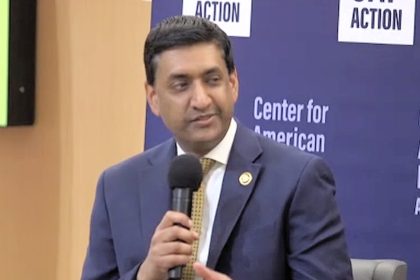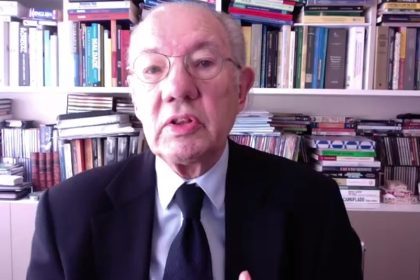Former Patent Office Director Says American Ingenuity Answer to China IP Theft

WASHINGTON — From counterfeiting to talent acquisitions and even forced technology transfers, the United States has long struggled with the idea that China is facilitating or condoning the theft of American intellectual property. In fact, China is often cited as the world’s principal IP infringer. But as lawmakers discuss potential penalties for intellectual property theft in Congress, experts wonder whether the issue requires national efforts to deter nefarious behavior or simply to devote more effort to preserving America’s role as a global leader of technology.
“There are multiple ways of thinking about the challenges China imposes when it comes to intellectual property,” Andrei Iancu, the former director of the U.S. Patent and Trademark Office told a gathering of the National Press Foundation. From insertion of fake goods into the stream of international commerce to acquiring American industries, technology and talent — not to mention straight up espionage — Iancu said Chinese actions have potential dire implications for global trade, national security, patents, and profits.
But while he equally wants to see proposals to tackle IP, he acknowledged that the U.S. must focus as a nation “positively, inward, at our own technological development.”
“The U.S. faces very significant competition, but we must attend not just to China’s theft of IP, but to our own internal development,” said Iancu.
In 2020, China agreed to reforms to protect the intellectual property of U.S. companies, and recently amended its patent, copyright, and criminal laws. But it is yet to be seen if and how these changes are to be implemented, and U.S. officials say the reforms may not go far enough.
“The level of counterfeiting, access to our data, and breaches taking place cumulatively has to be more than in the past,” said Iancu, pointing to the over 2,000 open investigations against China for espionage, meddling, hacking, and stealing vital U.S. technology.
For this reason, China remains prominent on The Trade Representative’s “priority watchlist” of nations with practices that require monitoring, which also includes Argentina, Chile, India, Indonesia, Russia, Saudi Arabia, Ukraine, and Venezuela.
China’s unfair market practices, combined with political influence and local protectionism in the Chinese courts contributes to a system that enables IP theft, but China also promotes a strong environment for intellectual property progress for its own citizens.
“China generates almost three times as many patents as anywhere around the world,” said Iancu. In fact, the nation received over 9 million patent applications in 2020 alone. “It publishes more peer reviewed articles… graduates more scientists on an annual basis… and [is] impressing on leadership of standards bodies around the world.”
“In every category, [China is] making progress on scientific advancements,” said Iancu. And this is true despite the fact that its overall explosive growth in past decades — and accelerating growth in most recent years — is being fed by non-market factors, including government subsidies for patent filing.
“Ultimately we cannot compete with China on the number of people and… where economic attention is focused,” said Iancu. Calling for a diversity of U.S. creators from racial, ethnic, and geographic backgrounds, he suggested that the answer may be about both sanctions and an increase in American ingenuity.
“We need more inventors as we get involved in an innovation ecosystem.”























